

| Click on a book's image or title to order from Amazon.com |
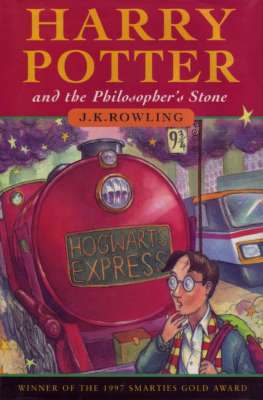
Harry Potter and the Philosopher's Stone
Bloomsbury (U.K.), HC, © 1997, 223 pp, ISBN #0-7475-3269-9Reviewed February 2000
This is the British edition of the popular children's book, which was renamed for US publication Harry Potter and the Sorcerer's Stone (I guess Americans don't believe in philosophy, or something). I've had this book recommended to me by several people, hearing it compared to books like Ursula K. LeGuin's Earthsea trilogy.
The story is this: Harry Potter is a boy in England whose parents are killed when he is an infant. In fact, his parents are wizards, and were killed by the evil wizard Voldemort, but Harry somehow reflexively vanquished Voldemort even thought he was a baby. Dumbledore, the head of the wizards' school Hogwarts, deposits Harry to grow up with his uncle, aunt, and cousin, the Dursleys. Harry's childhood among the "muggles" - the un-magicked folk - is miserable, as his foster-family can't stand unusualness, which seems to follow Harry around.
Finally, on his eleventh birthday, Harry learns the truth: That he's a wizard, and that he's nigh-legendary among other wizards. And, he's to enroll in the Hogwarts for his education for the next seven years. The remainder of the book involves Harry's trip to Hogwarts, the friends and enemies he makes there, and the year-long adventure he has during his first session at the school.
It's a charming book, perhaps a little less sophisticated than the Earthsea books, but still quite good. What makes it interesting is partly the peculiar British charm that the book has, and partly how Rowling structures Hogwarts and the magic the characters possess. She doesn't quite establish rules for magic, but she does establish a framework in which to think about magic: It requires hard study, much of which is tedious (The History of Magic, for instance, is one of Harry's classes). There are trading cards of great magicians, and a game - Quidditch - played on flying broomsticks. And broomsticks (and many other things) are commodities, which are bought and sold, and come in different models (the "Nimbus 2000", for instance). While not everyone can do magic (indeed, wizards live in a world largely hidden from us ordinary muggles), for those who can, it's a skill as well as a talent.
The book also evokes some of the problems and pleasures of school years, as we see Harry make new friends (particularly Ron Weasley, the next-to-youngest of a family of wizards, and Hermione Grangier, the class know-it-all), get involved in competition with other houses at the school, and grapple with his school work. Harry comes out of his childhood shell, and although his talents are not a panacea - indeed, being famous for an act he can barely remember makes him wonder if he can live up to his advance press - he does learn what he can do and gains confidence in himself.
Although clearly a children's book (and I did have a mild longing that a similar approach could be taken in a more adult story), it's still an entertaining book that should amuse everyone.
You can also read my review of the film adaptation of the book.
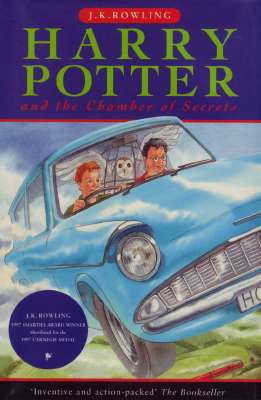
Harry Potter and the Chamber of Secrets
Bloomsbury (U.K.), HC, © 1998, 251 pp, ISBN #0-7475-3849-2Reviewed April 2000
The sequel to Philosopher's Stone naturally can't quite rely on the same "gosh-wow" factor of the first book, since many of the cool elements of Harry Potter, his friends, and the magical school of Hogwarts have already been introduced. Okay, since this is a childrens book, some of them can be relied upon: Large sections of the first book are recapped in a manner rather different from the approach taken in adult novels, and parts of the book's structure exactly mirror the first book. For instance, the early segment of the book involves Harry being oppressed by his uncle and aunt, the Dursleys, who hate the fact that he's a wizard and wish he'd go away, since he upsets their view of the universe.
This segment actually points out the most basic problem with the whole book: That the adults in the story seem to be relatively foolish, not showing any more than the most basic imagination, and not really looking out for the kids in any meaningful way. You'd think some of the more benevolent teachers would recognize Harry's difficult situation (after all, they put him there!) and take a few unusual steps to alleviate the worst of it. But pretty much Harry is on his own. Presumably Rowling is trying to paint a picture that will be familiar to certain kinds of children - who don't trust adults, who have been conditioned by peer pressure not to 'tattle', or who just enjoy seeing kids solve real problems all by themselves - but it still rankles. (The blatant favoritism displayed by Professor Snape is particularly repellant. Even when I had a teacher I really disliked I never felt he was out to get me, I just figured we didn't get along.) It seems like a message could be at least subtly buried in there as well.
Beyond that, though, the story is about as good as the first book's. Harry needs help from his friend Ron Weasley to return to Hogwarts, and they need to dodge the 'help' of an imp named Dobby who wants to prevent Harry from returning in order to save his life. There's a new, self-important professor at the school, and a conspiracy afoot, since someone has opened the hidden "Chamber of Secrets" at the school and students are being paralyzed by mysterious means. A school legend suggests that the heir to one of the school's founders plans to destroy the school from within, and the question is: Who?
The book relies primarily on that mystery, though it throws in some magical hijinks, such as Ron's wand breaking and backfiring periodically (with disgusting results at one point, which presumably leaves some children paralyzed with laughter as Ron is belching up slugs - of the escargot variety, I mean). There are plenty of subjects, including two of Ron's siblings, the new professor, and Draco Malfoy, Harry's arch-rival at the school. Events are pushed closer to the edge than in the first book, and the ultimate resolution works pretty well, even explaining why Harry was best-suited to solve the problem (though not why the other professors hadn't picked up on some of the clues that he did).
Overall, it's not quite as good as its predecessor, mainly because it is a sequel, but it's perfectly charming all on its own.
You can also read my review of the film adaptation of the book.
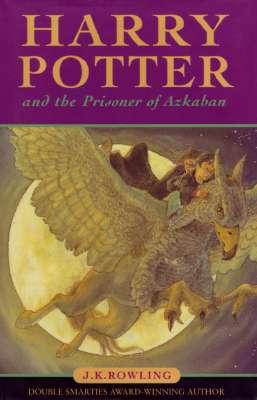
Harry Potter and the Prisoner of Azkaban
Bloomsbury (U.K.), HC, © 1998, 317 pp, ISBN #0-7475-4215-5Reviewed April 2000
The third book in the series has the most complicated plot to date. As usual, it opens with Harry winding up another miserable summer with the Dursleys, but this time a visiting aunt drives him over the edge, causing him to run away from home. He is soon picked up by the Knight Bus, after glimpsing a huge black dog which appeared to be watching him. The Bus takes him to a wizards' hotel where adult wizards are glad to find him safe, for the notorious prisoner Sirius Black has escaped from the escape-proof prison of Azkaban! And he may be out to kill Harry!
Harry meets up with his friends Ron and Hermione, and Hermione buys a new familiar, a cat named Crookshanks, who appears to have it in for Ron's lazy rat Scabbers. They head off to school on the Hogwarts Express, where they meet the new, rumpled-looking teacher of Defence Against the Dark Arts, Professor Lupin, and encounter a Dementor, a dark, ethereal creature which guards Azkaban, and which is one of a horde of such creatures searching for Sirius Black. Harry, it turns out, has an especially bad reaction to the Dementor, passing out for several minutes at the sight of it. They finally arrive at Hogwarts to find the Dementors guarding the entrances to the school.
At school, Harry is given a wondrous map of the institution, Hermione is taking more classes than physically possible - including ones scheduled at the same time - and the Gryffindor Quidditch team hopes to finally capture the Quidditch cup from Slytherin. The third-year students take Divination with Professor Trelawney (who predicts various dire things for our heroes), and find Lupin to be a terrific Defence Against the Dark Arts teacher. Meanwhile, Hagrid, Hogwarts' gamekeeper, begins teacher Care of Magical Creatures, which goes wrong in the very first lesson. It's business as usual, and yet everything seems to be going wrong one way or the other, culminating in a disastrous Quidditch match against Ravenclaw.
Prisoner doesn't quite have the same charming feeling of the first two books, and yet this makes sense because it appears to be a turning point in the series: Harry and company are starting to grow up, we learn more of the backstory involving Harry's parents, Dumbledore, Lupin and the testy Professor Snitch, and get more glimpses of how the wider world of wizardry operates. It's a more sophisticated book, and promises further sophistication in future installments.
What ultimately makes the book work is Lupin, who is the first accessible teacher to befriend Harry (McGonagall is a bit too stern, and Dumbledore too removed, to entirely fill this role), and whose background connects to many of the other plot elements. The mysteries in this book are kept a bit more tightly than in previous books, which makes it more rewarding to an adult reader, and the ultimate story of Sirius Black is both reasonable and satisfying, avoiding the obvious resolutions without seeming like it was pulled out of a hat. Rowling's skill as a storyteller, weaving the pieces of her story together, has advanced considerably in this book.
Overall, Prisoner is a book on a par with Philosopher's Stone, although it's a very different kind of book overall.
You can also read my review of the film adaptation of the book.
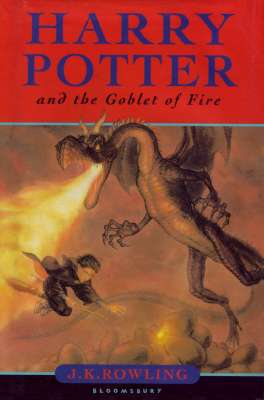
Harry Potter and the Goblet of Fire
Bloomsbury (U.K.), HC, © 2000, 636 pp, ISBN #0-7475-4624-XReviewed August 2000
The book with the highest initial print run in the history of American book publishing does not disappoint: It's just as good as its predecessors. Okay, it's not the best book ever published; as with the rest of the series, it cops out on some of its potential and is, ultimately, a kids' book, not a sophisticated adult novel. But it's still great fun.
Harry is invited by his friends the Weasleys to attend the Quidditch World Cup, where he sees Quidditch as it's played by the professionals, as well as the largest gathering of wizards in his experience. The night after the match, however, a group of Death Eaters - former followers of Lord Voldemort - terrorize the crowd, and the Dark Mark - Voldemort's symbol - appears in the nearby forest. Similarly, Harry's scar has been hurting, and he's had a dream that the Dark Lord is trying to return to power.
Harry then begins his fourth year at Hogwarts, and the annual Quidditch series is cancelled in favor of the long-delayed Triwizard Tournament: Three champions are chosen by the Goblet of Fire to represent Hogwarts and two other schools. Representatives of the other two schools (which are implied to be in France and Germany) arrive. Only sixth-year and older students can compete in the potentially-dangerous tournament, but to his surprise, Harry's name is chosen as a fourth champion.
Classes commence as usual, and there are several new faces around the school: Aside from Madame Maxime and Professor Karkaroff and their champions Fleur Delacoeur and Krum from the other schools, are muckraking columnist Rita Skeeter, the new (and paranoid) Defence Against the Dark Arts teacher Professor Moody, and Bagman and Crouch, representatives from the group which organized the Tournament.
Harry proves capable of matching the other champions in the tournament's tasks, and also starts to display his crush on his fellow Quidditch player Cho Chang when he needs to ask someone to the Yule Ball which honors the tournament's champions. Through it all, the question of who put Harry's name in the Goblet haunts Harry and his friends, and Rita Skeeter's nasty columns about Harry, Hermione and Hagrid don't help. Naturally, the rival Slitherin House members take best advantage to make fun of Harry.
Goblet is perfectly entertaining and features a much more complicated plot than the previous books. Rowling sets up clever bits early in the book that pay off at the end. And Harry, Ron and Hermione are starting to grow up and take more responsible roles in the wizarding community.
The climactic sequence is longer and darker than in the other books, and Harry faces his most desperate moment yet. It's carried off reasonably well, although when push comes to shove the bad guys behave somewhat stupidly and Harry is saved almost more by dumb luck than by anything else. One hopes that it's a foreshadow of things to come in future books, that Harry will be able to be a true hero later on.
As has been widely reported in the press, a "recurring character" dies in the book, although the identity of the doomed soul is ultimately disappointing, as Rowling misses a chance to create a real tragedy by killing someone we've really come to know and love; death in fiction should try to convey as much a sense of loss as possible, to really make the reader understand the magnitude of what's happened. On the other hand, I must credit Rowling with doing a reasonably good job given the choice she made.
The other problem with the book is that it ends with 30 or 40 pages of exposition explaining everything that was going on in the book. It's well-written, but it's still exposition. Rowling basically wrote herself into a corner in this way, since she couldn't easily reveal the truth a little bit at a time, so everything had to be explained at once. It actually works fairly well, but it is pretty easy to think, 5 pages into the exposition, "Hey! Nothing's really happening!"
Overall I'd rate this book better than Chamber of Secrets, but slightly below the other two books. Nonetheless, I await the next book eagerly!
As always, I'd recommend people buy the British editions of this book (and the others) from somewhere like Amazon UK, since they're both smaller and have much nicer cover art (as I've reproduced in miniature on this page).
You can also read my review of the film adaptation of the book.
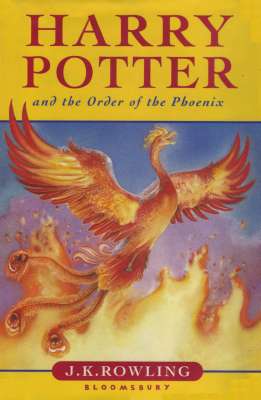
Harry Potter and the Order of the Phoenix
Bloomsbury (U.K.), HC, © 2003, 766 pp, ISBN #0-7475-5100-6Reviewed July 2003
It took three years, but J.K. Rowling finally came out with the fifth - and longest - of the Harry Potter series. Alas, it wasn't worth the wait, and is the weakest of the series.
A month after his ordeal at the end of Goblet of Fire, Harry is bored out of his mind living with his aunt, uncle and cousin, and cut off from any news of the goings-on in the wizarding world. Only when Harry is attacked by a couple of Dementors do wizards arrived to bring him back into the fold. He learns about The Order of the Phoenix, a group of wizards (consisting of many of his friends and mentors) dedicated to opposing Lord Voldemort. He also learns that Cornelius Fudge, head of the Ministry of Magic, doesn't believe Voldemort has returned, and that Dumbledore is making a power play for his job.
To this end, Fudge installs Professor Dolores Umbridge at Hogwarts to watch and report the goings-on there - and, ultimately, to effect changes to the benefit of Fudge and the Ministry. Harry is especially suspected by Umbridge, and he repeatedly runs afoul of her. Meanwhile he prepares for his OWL (Official Wizarding Level) exams at the end of the year, has disturbing dreams about a strange door he's trying to get through, hears nothing from Dumbledore about the Order's movements (or anything else), and starts his own clandestine Defence Against the Dark Arts class (since Umbridge's is so ineffectual).
The biggest problem with Harry Potter and the Order of the Phoenix is that it's far too long, and is badly in need of heavy editing. There are many extraneous and just plain boring sections of the book. For instance:
- The hundred-or-so pages between Harry leaving the Dursleys' and arriving at Hogwarts, during which he mostly hangs around the headquarters of the Order and has an encounter at the Ministry of Magic which is essentially predictable.
- A subplot involving Hagrid which is basically superfluous to the story.
- Going into agonizing detail about what a horrible person Professor Umbridge is, when a few clear examples - and there are many in the book - would have sufficed.
- Not to mention many little scenes which simply weren't needed and didn't add anything to the story.
The book is also hampered by Harry basically behaving like something of an idiot throughout. To be fair, Rowling is clearly portraying Harry as being smack in the middle of his adolescent-rebellion years, but mostly this just makes him essentially unlikeable. He grouses and yells throughout the book (and it's worth noting that his peers generally don't do this), and rarely acts with much thought behind it. Typical of Harry's behavior, when he's first given a chance to ask questions of members of the Order, the question uppermost in my mind - "Why was I attacked by Dementors?" - isn't even on the list. All of this seemed like a pretty flimsy pretext for Harry to commit some even bigger blunders later on. (And Dumbledore is conveniently kept to the side of it all for hardly-believable reasons.)
Which brings me to the other big flaw in the book: Despite ample opportunities to do so, it seems like no one ever learns anything in this book. The mistakes Harry makes don't teach him anything (except maybe, "be less credulous"), they're just there to get him into tight spots. Of particular disappointment is Harry's ever-antagonistic relationship with Professor Snape: They don't like each other, and in this book we find out why Snape feels the way he does (not that it's particularly exciting). But given several tasty chances for Harry and Snape to evolve their relationship - not necessarily to become buddies, but to develop some respect for one another, or to take things in an unexpected direction - Rowling balks at every pass. It was tremendously frustrating, and in the end we're left with the status quo.
Alas, character development is proving to be as weak a point for Rowling as plotting. Ron is finally given the chance to evolve - he joins the Quidditch team - but his own triumphs take place off the page, as Harry is busy elsewhere at Ron's moment of truth. The germ of Harry developing into a leader - through his Defence Against the Dark Arts class - are pretty routine. Given that Rowling's created such rich basic personalities, it's sad to see them remaining essentially unchanged through the series.
Order does have its good scenes, mostly of the action and humor variety: Fred and George Weasley and their practical jokes are the focus of one of the book's best moments, in their defiance of Professor Umbridge's decrees. The OWL exams were intriguing in their layout, and I rather wish we'd seen a bit more of them - perhaps structuring a longer portion of the book around them. And then the climactic sequence of the book - in which Harry learns why he's been having strange dreams, and he and his friends must confront the latest challenge from Lord Voldemort - is one lengthy, extremely tense chase and battle, which is quite well done. (Alas, it's undercut by the next 30-or-so pages, which are primarily exposition.)
If Order can be said to be about anything, it's about friendship and comradeship in the face of despair and overwhelming odds - all of which Harry faces repeatedly throughout the novel. That Hermione, Ron and others stick with him despite his moody persona is itself basically touching, and there is the possibility that Harry will listen to their protestations in the future, after the outcome of this adventure. We shall see.
Ultimately, Order feels like it was a book necessary for Rowling to take some pieces on her chessboard and move them from here to over there, with a little romp in the middle. But it's not as creative, as fresh, or as wonder-inspiring as any of the earlier books. Despite some good moments, it feels like a big missed opportunity, a marking of time rather than a march of progress.
I can only hope that the next book will see a return to form - preferably a shorter form, more focused, and less frustrating.
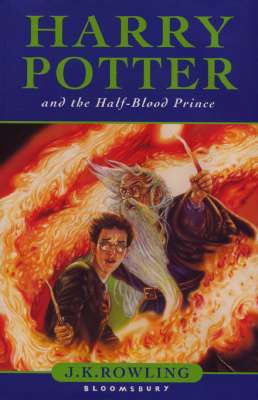
Harry Potter and the Half-Blood Prince
Bloomsbury (U.K.), HC, © 2005, 607 pp, ISBN #0-7475-8108-8Reviewed July 2005
The sixth volume of the Harry Potter series, let's get right to the synopsis:
Following the events of Phoenix, Harry returns to live with the Dursleys for the summer. But as Lord Voldemort and his Death Eaters begin wreaking havoc on the wizarding (and Muggle) world, Dumbledore decides that Harry would be safer living with the Weasleys. However, first he brings Harry to recruit a former teacher, Professor Slughorn, to return to Hogwarts. Slughorn is a self-important, albeit reasonably friendly, fellow who "collects" students whom he sees as having a bright future, and therefore he treats Harry genially.
While preparing for the upcoming year, Harry, Ron and Hermione see Draco Malfoy in Diagon Alley. Harry suspects him of being not only up to no good, but of becoming a Death Eater in his father's place (a notion foreshadowed in the first chapter, in which Malfoy's mother meets with Professor Snape).
At Hogwarts, Dumbledore begins to have private meetings with Harry in which he shares memories of Lord Voldemort's early life, including a tainted memory of Slughorn's. Meanwhile Harry becomes increasingly obsessed with foiling Malfoy, despite a lack of hard evidence that he's really up to anything serious. Lastly, it turns out that Slughorn is the new potions teacher, while Snape has finally been given his wish of becoming the Defence Against the Dark Arts teacher.
On the bright side, Harry happens to acquire a copy of an old potions textbook with copious notes written in it improving on the text's instructions. The book is inscribed as being the property of "the half-blood prince", his true identity unknown. Harry aces potions tests with the help of the book, to the great frustration of Hermione. Harry also becomes the captain of the Quidditch team. Of a more mixed blessing is Ron's acquiring of a girlfriend, Lavender Brown, causing a deep rift between him and Hermione, as Ron and Hermione are clearly interested in each other. Meanwhile Harry's developing a crush of his own.
Prince is a better book than its predecessor, Order of the Phoenix, although that's damning it with faint praise. The book has a number of problems, but it's all-in-all more satisfying than its predecessor.
The problems: Although 150 pages shorter than Phoenix, Prince is still a very padded novel. For instance, the first chapter of the book is pointless - being an information-free encounter between a very minor character and a throwaway character - and the second is there only to reveal a detail about Snape's involvement with the Death Eaters, a detail which is later revealed in a different way, thus rendering this chapter redundant. Rowling also has a lamentable tendency to lapse into superfluous exposition and reflection on Harry's state of mind. She's fallen into a "tell them don't show them" habit, and stylistically she's just not a strong enough writer to get away with that.
I joked as I was reading the book that it could be called Harry Potter and the Half-Wit Plot, but it's not as bad as all that. Still, other than Prisoner of Azkaban, Rowling is not a strong plotter. Prince's plot at its best focuses on Harry's relationships with his friends, which are by far the best part of the book. The Dumbledore and Malfoy threads develop haphazardly: The early life of Voldemort is kind of interesting, but seems mostly irrelevant; more text that could have been edited out. The Malfoy thread proves pivotal to the end of the book, but Harry spend a lot of time spinning his wheels worrying about it without getting anywhere. Both threads have 90% of their development in the last 20% of the book.
As I said, Harry's social circle is the best part of the book, as he and his friends continue to go through their teenage years trying to figure out who they are, and how they fit into their world. Harry finds leading the Quidditch team to be frustrating in its challenges, and there's a sense that he's largely outgrown Quidditch. He, Ron and Hermione all act foolishly, but one would expect little else at this point in their lives given the circumstances.
The reason this is the best part is because this is where the fun is. Rowling's approach to writing intrigue and suspense has turned - over the last couple of books - to be just not much fun. The stakes the characters are playing for are so big that there's just little hope that there will be a happy ending short of actually ending the threat of Voldemort, which obviously won't happen in this volume. This is why Phoenix was just not much fun; the sense of wonder was lost.
Then there's the half-blood prince. This is a neat little story device, although not really one worthy of the book's title, as it's not a very significant factor in the book. Certainly not a necessary one, as Rowling could have had Harry impress Slughorn by simply being happy enough to not be taking potions from Snape that he's motivated enough to become a better student. Ultimately there are only two serious candidates for the identity of the prince, and I think Rowling chose the wrong one; there was little emotional impact to the revelation, and choosing the other figure would have lent some insight into one of the series' more mysterious significant characters.
(I found Hermione's objections to Harry's using the half-blood prince's notes perplexing. I guess she was just envious, although nothing stopped her or Ron from using the notes, and if they're genuinely valuable, isn't it in their best interests to learn the best that they can, regardless of whether the source is their instructor or not? This was a peculiar piece of moralizing which I just couldn't get behind.)
Prince climaxes with a big battle, a major tragedy (widely hinted at in the media), the (perhaps) surprising behavior of a major character (whose actions I suspect will be explained away by events earlier in this novel, although if that's so then I'll pronounce it lame), and another odd mystery presumably to be revealed in the seventh (and reportedly final) book. Rowling is pretty good at writing these sorts of climactic scenes, although a tragic ending to a third book in a row is not particularly welcome, and many details are left hanging when the book ends.
I think that Phoenix killed much of my enthusiasm for the series; what was once a promising story arc about Harry's coming-of-age in a strange and wonderful environment has become a nasty story of violence and revenge, and I don't think Rowling's writing skills are up to the task of telling such a tale. I think Prince would have been better served by cutting out the fat (of which there's a lot), and rethinking the Dumbledore/Malfoy threads to give them more immediacy, rather than just a year's worth of Harry spinning his wheels.
But mainly, I think the big problem is that Rowling's not able to maneuver the pieces of the story around in the ways she wants without losing sight of the fun and sense of wonder that made the first three books so enjoyable. It's become a rather dreary tale, and that's a real shame.
hits since 13 August 2000.